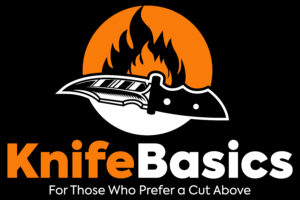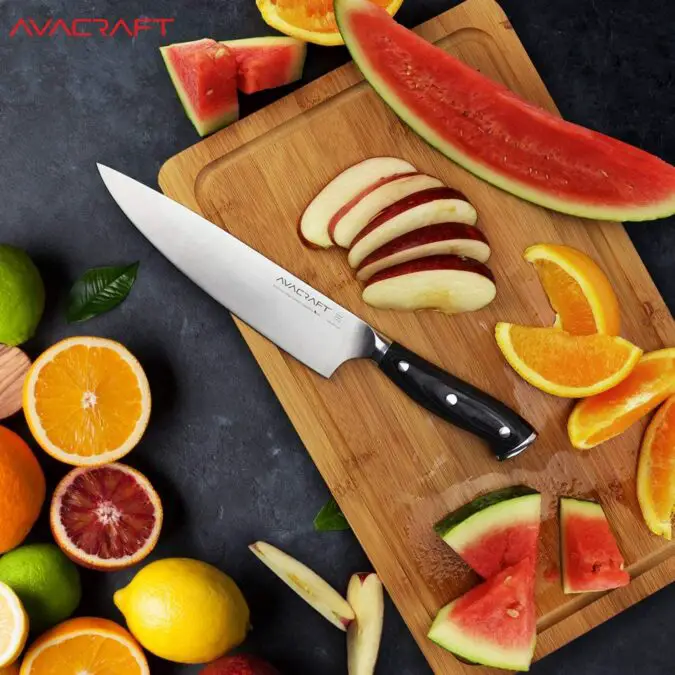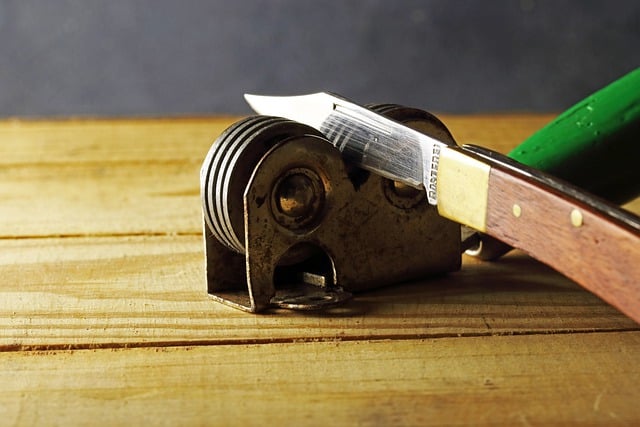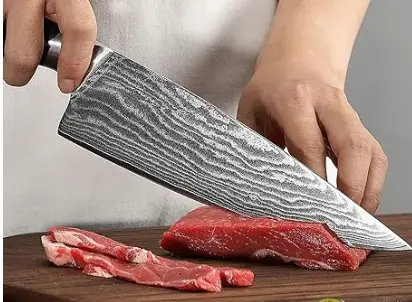In this article, we are going to have an in-depth look at 1.4116 steel. We are going to check its composition, properties, and comparison to other knife steels.
You have probably come across 1.4116 steel in German Made knives and wondered how it stacks against other types of knife steel. Is it worth getting?
In summary 1.4116 steel is stainless steel with excellent corrosion resistance, decent edge retention, and toughness. It is Ideal for most kitchen knives as it is easy to sharpen.
What is 1.4116 Blade Steel?
German 1.4116 steel is used in the knife-making industry to make kitchen knives, scalpels, and other sectors to make surgical equipment, cutlery, and cutting tools.
Although this steel is used to manufacture Swiss Army knives famous worldwide, it is not as well-known in other parts of the world.
The stainless steel DIN naming system specifies 1.4116 steel as X50CrMoV15 steel. 1.4116 steel will mostly be found in German kitchen knives. They are typically soft steel, have good edge retention, are corrosion-resistant, and are easy to sharpen even with low aluminum oxide abrasive tools.
1.4116 Steel Composition
| Element | Percentage composition |
|---|---|
| Carbon C | 0.45%-0.55% |
| Chromium Cr | 14.00%-15.00% |
| Vanadium | 0.10%-0.20% |
| Molybdenum | 0.50%-0.80% |
| Manganese Mn | 1.00% |
| Silicon Si | 1.00% |
| Sulfur S | 0.03% |
| Phosphorus P | 0.04% |
- Carbon C: Increases edge retention, hardness, and tensile strength. It also improves steel resistance to wear, abrasion, and corrosion.
- Chromium Cr: Formation of Chromium carbides. Increases the blade’s hardness, tensile strength, and corrosion resistance.
- Vanadium V: inhibits grain growth during elevated temperature processing and heat treatment, which enhances the strength and toughness of steel. It also forms carbides that increase wear resistance.
- Molybdenum Mo: increases toughness and hot hardness. It also improves hardenability and forms carbides for wear resistance.
- Phosphorous P: Considered an impurity but may Increase the strength and improve the machinability of steel
- Manganese Mn: improves the strength and hardness of steel. When the steel is heat-treated, hardenability is improved with increased manganese.
- Silicon Si: Increases strength and heat resistance.
- Sulfur S: Improves machinability but is regarded as an impurity in high quantities.
1.4116 Steel Properties as a knife material
How hard is 1.4116 steel?
German 1.4116 steel can be kept soft at around 54HRC for larger kitchen knives like cleavers and about 56 HRC for chef knives, Santoku knives, and other smaller knives that require good edge retention
Corrosion resistance
1.4116 steel is stainless steel with high corrosion resistance as it contains more than 14% Chromium elements. 1.4116 steel is food safe and can be used in areas with accelerated corrosion and rusting potential and remain intact.
The corrosion resistance abilities of the steel make it easy to maintain. Because of this feature, German 1.4116 knife steel qualifies as suitable steel in the manufacture of Swiss Army survival knives and kitchen knives. It can withstand harsh conditions outdoors and in the kitchen.
Toughness
At a Rockwell hardness of 54-57HRC, 1.4116 steel offers a decent toughness, it is not the toughest steel out there. The blades can withstand impact without fraction and abrasion without breaking. The excellent balance between its toughness and hardness makes it a reliable steel.
The excellent toughness level of DIN 1.4116 stainless steel is largely attributed to its intermediate carbides content, which are not too large to break easily or too fine to attain a high HRC level. German steel 1.4116 toughness is comparable to the M398 steel and slightly lower than the D2 tool steel.
- SK5 Steel Durability: Made from industrial-grade SK5 high carbon steel, these heavy duty utility blades provide exceptional hardness and edge retention. Compared to standard carbon steel, SK5 offers improved wear resistance and extended life span, ensuring fewer blade changes and higher efficiency during cutting tasks. Whether you're working on renovation projects, packaging, or construction sites, these blades can handle tough materials like carpet, drywall, rubber, and rope with ease
- Standard Size Fit: This utility knife blades 100 pack is crafted to meet universal blade specifications, ensuring a perfect fit with most retractable utility knives, folding knives, and box cutters. Whether you're replacing utility knife blades for everyday tasks or switching out box cutter blades on the job, these standard-size blades deliver reliable compatibility and performance you can count on across various tools and scenarios
- Razor Sharp Edge: Our razor blades for utility knife are precision-honed to deliver ultra-sharp, clean cuts every time. Engineered with a refined edge angle, these blades slice effortlessly through thick cardboard, leather, carpet, vinyl, linoleum, soft metals, and more. The sharpness reduces drag, improves control, and minimizes hand fatigue—making it the ideal choice for DIYers, contractors, or warehouse professionals
- Safe Storage Box: Each set comes with a compact and durable utility blade storage box that protects blades from dust, moisture, and accidental contact. The slide-out design allows safe, one-at-a-time access to blades while keeping unused blades neatly organized. Whether stored in a toolbox, desk drawer, or tool belt, this box keeps your workspace safer and your workflow smoother
- Trusted by Pros & DIYers: These replacement blades for utility knife are built with Jetmore’s commitment to precision and durability. Whether you're a professional in construction, a warehouse operator, a DIY hobbyist, or simply handling everyday home repairs, Jetmore delivers blades you can trust. We stand behind our quality—so you can cut with confidence, knowing your tools won’t let you down
- Notice: Be sure to watch our HOW-TO video before using it. It can help you slide the utility blade out quickly and easily
- Super Versatility: It is made entirely according to standard utility knife blades and fits most standard & fixed utility knives perfectly
- Affordable: Includes 100-pack replacement blades and they come in a well-built case for safe storage and disposal. Each blade is rigorously tested and we firmly believe this is a great deal
- Durability: WORKPRO utility knife blades are made from SK5 steel, which is of high quality and durability
- Sharp: The knife blades are highly sharp and cut through lots of materials easily and without hesitation. Ideal for cutting cardboard, leather, linoleum, rope, soft metal, etc
- Heavy duty utility blade for general cutting, trimming, and scraping of a variety of materials
- Precision-honed edge for consistent and long cutting life
- Fits most standard utility knives
- 100 pack
Edge retention
Edge retention is the ability of steel to hold a sharp edge, and the hardness of steel greatly influences it. Although German steel 1.4116 is not very hard steel, it does not become dull very fast but be ready for frequent sharpening.
German 1.4116 steel blade will give you edge retention comparable but slightly less to Japanese AUS 8 stainless steel and the popular Chinese 8Cr13MoV stainless steel. Their edge retention is not the best, but they are easy to sharpen.
Wear resistance
With its level of hardness, 1.4116 steel offers good wear resistance. 1.4116 knives do not wear out faster compared to other low-end knives, even when used for frequently demanding applications.
However, if you want the blades to serve you for a long time, do not expose them to more than they can handle. You can only enjoy long service from 1.4116 knives if you use them for the right tasks and limit grinding them with hard abrasives.
Sharpening 1.4116 German steel
1.4116 knives are easy to sharpen. You will get a razor-sharp edge with simple sharpening tools and basic sharpening skills. This property balances the maintenance equation for blades made from this steel since they require frequent sharpening. The process does not take your time and energy even with frequent sharpening, making 1.4116 knife steel maintenance easy.
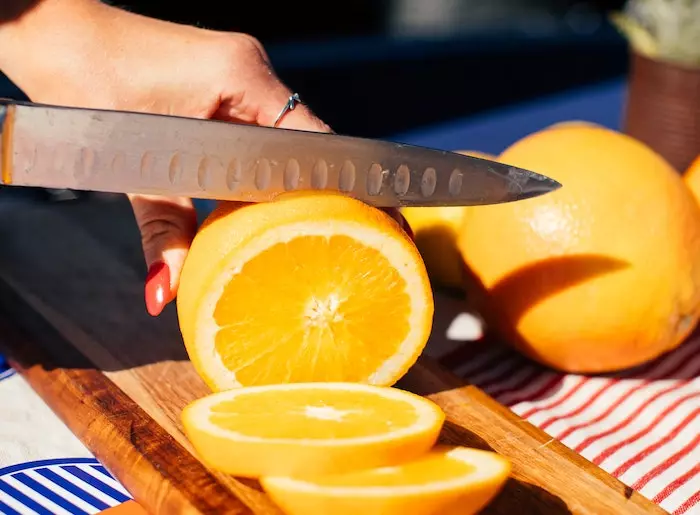
1.4116 steel equivalent
X50CrMov15 steel and 440A steel are considered 1.4116 steel equivalents. These steels have a similar composition, and their performance is identical. All three steel are popular in different regions respectively, with 1.4116 popular in German knives, X50CrMoV15 popular in European knives, and AISI 440A found in United States knives like CUTCO.
1.4116 Steel vs 440C steel
| 1.4116 steel | 440C steel | |
|---|---|---|
| Toughness | 2.5 | 3.5 |
| Edge Retention | 2.5 | 4.5 |
| Corrosion Resistance | 8 | 7.5 |
440C stainless steel contains more Carbon and Chromium than German 1.4116 steel; 440C thus offers higher hardness and holds an edge longer. On the other hand, 1.4116 is easy to sharpen, offers better corrosion resistance, and is affordable. 1.4116 is more of a replica to grade 440A steel than 440C
The added Carbon in Grade 440C stainless steel enables it to achieve a higher hardness of up to 60HRC when properly hardened. The amount of carbon also enables the formation of a large volume of carbides which are excellent in wear resistance and edge retention.
Ironically 440C steel, even with a higher attainable Rockwell hardness than German 1.4116 steel, offers slightly better toughness. A 440C blade is less prone to chipping and cracking than a 1.4116 stainless steel blade.
1.4116 steel vs D2 Steel
| 1.4116 steel | D2 steel | |
|---|---|---|
| Toughness | 2.5 | 3.5 |
| Edge Retention | 2.5 | 5 |
| Corrosion Resistance | 8 | 4.5 |
D2 steel is a tool steel with excellent wear resistance and edge retention. D2 steel contains a higher amount of carbon than 1.4116 steel. The higher carbon content enables it to achieve higher hardness giving it better wear resistance and edge retention than 1.4116 stainless steel.
You will get a better knife with D2 blade steel in terms of edge retention, wear resistance, and toughness. Its high carbon alloy composition enables it to form fine-grained structures suitable for these properties.
However, a 1.4116 stainless steel knife will beat a D2 steel knife in corrosion resistance. D2 steel does not contain enough Chromium to make it stainless steel; it is often regarded as semi-stainless steel. A D2 steel blade will be more expensive than a 1.4116 blade due to its edge holding capacity despite the low corrosion resistance property.
1.4116 Steel vs AUS 8 Steel
| 1.4116 | AUS 8 steel | |
|---|---|---|
| Toughness | 2.5 | 6 |
| Edge Retention | 2.5 | 3 |
| Corrosion Resistance | 8 | 7 |
AUS 8 stainless steel is mid-range Japanese steel with higher carbon than German 1.4116 steel. The high carbon content enables AUS 8 stainless steel to achieve higher Rockwell hardness. The increased hardness enables AUS 8 steel knives to offer marginally better wear resistance and edge retention than 1.4116 stainless steel knives.
AUS 8 steel properties are more similar to 8Cr13MoV stainless steel. They offer the same edge retention, toughness, and corrosion resistance. German 1.4116 stainless steel, however, beats both of them in corrosion resistance.
It is worth noting that the difference between AUS 8 steel and 1.4116 steel is extremely minimal. The performance difference is noticeable in normal daily use. Your choice for the blade to go with should ideally be based on price and build quality of handle materials.
1.4116 Steel vs 7Cr17MoV steel
7CR17MOV stainless steel has higher Chromium and carbon in its composition than German 1.4116. It offers excellent corrosion resistance, retains sharpness for long, and is tougher. While 1.4116 is suitable for kitchen knives, 7Cr17MoV steel can be found in tactical and pocket knives due to its better edge holding capability and corrosion resistance properties.
1.4116 steel vs S30V
| 1.4116 steel | S30V steel | |
|---|---|---|
| Toughness | 2.5 | 4 |
| Edge Retention | 2.5 | 6 |
| Corrosion Resistance | 8 | 7.5 |
S30V steel is a premium powder metallurgy steel, it is better than 1.4116 steel in edge retention, hardness, and toughness. S30V steel is mostly used on pocket knives while 1.4116 steel is mostly used on kitchen knives. 1.4116 is easier to sharpen than S30V steel but it won’t keep an edge as long as S30V.
Is 1.4116 German cutlery steel good?
Is 1.4116 good knife steel?
- Multipurpose Knife Set: This kitchen knives set includes 8" Chef Knife, 8" Slicing Knife, 7" Santoku Knife, 8" Serrated Bread Knife, 5" Utility Knife, 3.5" Paring Knife, Kitchen Shears and 6 pcs Blade Guards
- Anti-rust coating: The healthy anti-rust coating protects the knife from oxidation and dishwasher safe, while the non-stick coating ensures the blades stay clean all day long
- Easy to carry: Each knife comes with a blade guard for safe, compact storage in your kitchen cupboard. These knives are also easy to carry when camping or storing in your RV
- Perfect Holiday Gift: Ideal for kitchen enthusiasts or new cooks, this knife set meets all cooking needs. It makes an excellent holiday gift for family, friends, lover and colleague
- Lifetime Warranty: Every knife set is backed by rigorous quality inspection, we provide a lifetime warranty for every customer, ensuring superior customer service and peace of mind with every purchase
- 【Premium Material】: Dealusy clear plastic knives heavy duty are made of food grade polystyrene, total BPA free and toxin free for your healthy meals.
- 【Extra Heavy Duty】: Each plastic knife weights 5.9g, our heavy duty plastic knives disposable with edge thickened design won’t bend easily.
- 【Heat Resistant】: These disposable knives can withstand a high temperature, ideal for hot and cold food.
- 【360 Value Pack】: This disposable knives bulk contains 360 count high quality clear plastic knives, perfect for your everyday use or serving a wedding, panic, party etc.
- 【Disposable or Resuse】: These strudy and durable knives are suitable for disposable use, or you can wash to reuse.
- Lightning-Fast Precision Meets Culinary Power: Inspired by The Scarlet Speedster, this officially licensed The Flash Edition chef knife slices with blistering speed and control. The ultra-sharp 8-12° double-bevel edge glides through prep with zero drag, delivering searing precision and friction-free performance like a Super Hero.
- Forged From Premium German Steel: Crafted from high-performance X50CRMOV15 stainless steel, trusted by chefs worldwide for its balance of sharpness, strength, and durability. With a Rockwell hardness of 54-56 HRC, this blade resists chipping and corrosion, holds its edge under heavy use, and sharpens easily for a lifetime of reliable performance.
- Titanium Nitride Coating for Zero Drag: Finished with a striking gold Titanium Nitride (TiN) coating, this blade isn’t just built to shine — it’s built to zoom. TiN reduces drag and friction for faster, smoother slicing and adds a hard, wear-resistant layer that shrugs off corrosion and everyday wear, keeping your edge sharper, slicker, and longer-lasting.
- Collector-Worthy Detail, Pro-Grade Design: DC The Flash artwork is laser-etched into the mirror-polished blade, celebrating DC’s iconic Super Hero while enhancing slicing performance by reducing food stick. A G10 handle with copper spacer ensures superior balance, comfort, and control, while full-tang construction locks in strength from heel to tip.
- Includes Premium Leather Sheath & Collector Pin: Protect your blade in storage or on the go with a genuine stamped leather sheath featuring official The Flash insignia. Every knife includes an exclusive collector’s pin and Dalstrong’s lifetime warranty plus a 70-day money-back guarantee, because your investment should be protected.
